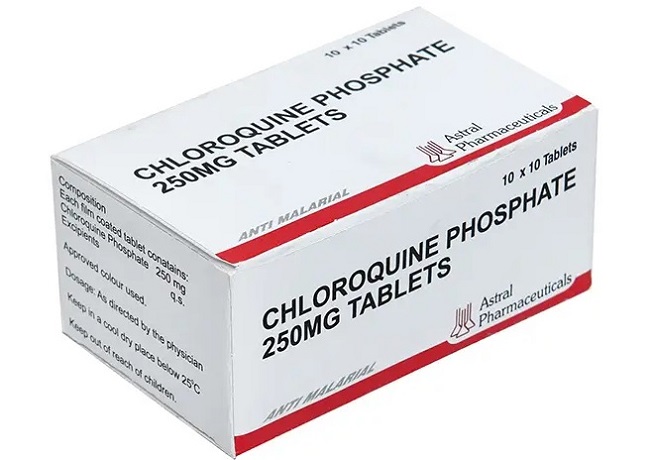Chloroquine Helps Restore Blood Vessel Function in Pulmonary Arterial Hypertension
Nikhil Prasad Fact checked by:Thailand Medical News Team Feb 07, 2025 2 months, 6 days, 7 hours, 24 minutes ago
Medical News: Pulmonary arterial hypertension (PAH) is a serious condition that affects blood vessels in the lungs, leading to high pressure and making it harder for the heart to pump blood. It is particularly common in people with congenital heart defects (CHDs), which are structural problems in the heart present from birth. CHDs can increase blood flow to the lungs, damaging blood vessels and making them stiff. Over time, this can cause breathing difficulties, heart strain, and even heart failure.
 Chloroquine Helps Restore Blood Vessel Function in Pulmonary Arterial Hypertension
Chloroquine Helps Restore Blood Vessel Function in Pulmonary Arterial Hypertension
Doctors and researchers have been looking for new treatments to improve lung blood vessel function in patients with PAH. One potential option is chloroquine, a drug originally used to treat malaria. Scientists have discovered that chloroquine may help restore normal function in the blood vessels of the lungs. This
Medical News report explores how chloroquine could offer new hope for people living with PAH.
What the Study Found
A team of researchers from Florida International University (USA) and the University of California, San Francisco (USA) conducted a study to understand how chloroquine affects lung blood vessels in PAH. The research focused on a specific group of cells called pulmonary artery endothelial cells (PAECs). These cells line the inside of blood vessels and are responsible for producing nitric oxide (NO), a molecule that helps blood vessels relax and function properly.
The study found that in PAH, the ability of these cells to produce NO was significantly reduced. This was due to lower levels of an essential molecule called tetrahydrobiopterin (BH4), which is necessary for NO production. The drop in BH4 levels was linked to decreased activity of an important enzyme called GTP cyclohydrolase 1 (GCH1).
When the researchers treated these cells with chloroquine, they observed a remarkable recovery in NO production. Chloroquine helped by increasing BH4 levels and preventing the breakdown of GCH1. As a result, blood vessel function improved significantly.
How Chloroquine Works
Chloroquine appears to work by blocking a process called autophagy, which is how cells recycle their components. In PAH, excessive autophagy leads to the breakdown of crucial proteins, including GCH1. By inhibiting this process, chloroquine preserves GCH1 levels and allows the cells to produce more NO, leading to healthier blood vessels.
To confirm their findings, the scientists also tested another drug, bafilomycin A1, which has similar autophagy-blocking properties. They found that it produced the same beneficial effects as chloroquine, further supporting the idea that stopping excessive autophagy could be a promising approach for treating PAH.
Why This Matters
PAH is a life-threatening disease with limited treatment options. Current therapies mainly focus on managing symptoms rather than addressing the root causes of the disease. The discovery that chloroquine can restore NO prod
uction by preventing GCH1 breakdown offers a new potential treatment avenue.
However, the researchers also caution that while chloroquine shows promise, it must be used carefully. The drug is known to have side effects, including effects on heart function. More research is needed to determine the safest and most effective way to use chloroquine for PAH patients.
Conclusion
This study highlights the potential of chloroquine as a treatment for PAH. By blocking excessive autophagy, the drug helps maintain the production of nitric oxide, a key molecule for blood vessel health. This discovery opens up new possibilities for improving the quality of life of people with PAH. Future studies will be needed to test chloroquine in human patients and to explore alternative ways of boosting NO production safely.
The study findings were published in the peer-reviewed: International Journal of Molecular Sciences.
https://www.mdpi.com/1422-0067/26/3/1352
For the latest on Pulmonary Arterial Hypertension, keep on logging to Thailand
Medical News.
Read Also:
https://www.thailandmedical.news/news/pharma-news-pulmonary-arterial-hypertension-pah-treatments-driving-growth-for-many-pharmaceutical-companies
https://www.thailandmedical.news/news/dofetilide,-an--antiarrhythmic-drug-identified-as-candidate-for-drug-repurposing-to-treat-pulmonary-arterial-hypertension
https://www.thailandmedical.news/news/exploring-inhaled-nitric-oxide-ino-as-as-an-adjuvant-covid-19-treatment-for-pulmonary-issues
